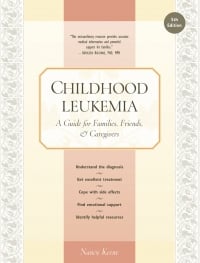Childhood Leukemia
Tyrosine Kinase Inhibitors
The Philadelphia chromosome makes a protein called BCR-ABL that activates enzymes called tyrosine kinases, causing cells to divide uncontrollably. Drugs that specifically target this protein (e.g., imatinib) are called tyrosine kinase inhibitors (TKIs). Other drugs in the TKI family are:
- Dasatinib (Sprycel®)
- Nilotinib (Tasigna®)
- Bosutinib (Bosulif®)
- Ponatinib (Iclusig®)
TKIs are currently the first choice to treat CML. If your child is prescribed one of these drugs, make sure you understand that TKIs can interact with other drugs, over-the-counter medications, vitamins, herbal supplements, and even certain foods, such as grapefruit and pomegranate. They also can harm the fetus of a pregnant teen. Because drugs in the TKI family target a specific protein, they do not damage healthy cells like chemotherapy drugs do. Treatment with these drugs is called targeted therapy.
Table of Contents
All Guides- Introduction
- 1. Diagnosis
- 2. Overview of Childhood Leukemia
- 3. Acute Lymphoblastic Leukemia
- 4. Acute Myeloid Leukemia
- 5. Juvenile Myelomonocytic Leukemia
- 6. Chronic Myelogenous Leukemia
- 7. Telling Your Child and Others
- 8. Choosing a Treatment
- 9. Coping with Procedures
- 10. Forming a Partnership with the Medical Team
- 11. Hospitalization
- 12. Central Venous Catheters
- 13. Chemotherapy and Other Medications
- 14. Common Side Effects of Treatment
- 15. Radiation Therapy
- 16. Stem Cell Transplantation
- 17. Siblings
- 18. Family and Friends
- 19. Communication and Behavior
- 20. School
- 21. Sources of Support
- 22. Nutrition
- 23. Insurance, Record-keeping, and Financial Assistance
- 24. End of Treatment and Beyond
- 25. Relapse
- 26. Death and Bereavement
- Appendix A. Blood Tests and What They Mean
- Appendix B. Resource Organizations
- Appendix C. Books, Websites, and Support Groups

